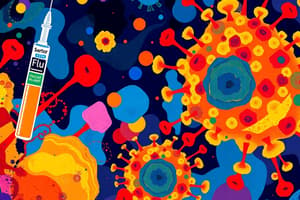Podcast
Questions and Answers
The length of flu symptoms is typically ____________ days
The length of flu symptoms is typically ____________ days
7-14
The treatment of flu involves managing symptoms and possibly using ____________ medication
The treatment of flu involves managing symptoms and possibly using ____________ medication
antiviral
Antiviral therapy with a neuraminidase inhibitor can shorten the duration of influenza symptoms by approximately one-half to three ____________
Antiviral therapy with a neuraminidase inhibitor can shorten the duration of influenza symptoms by approximately one-half to three ____________
days
The use of ____________ for flu is recommended when initiated promptly within 48 hours
The use of ____________ for flu is recommended when initiated promptly within 48 hours
Cough with any of the following: difficulty or labored breathing, SOB, blood, night sweats, cyanosis, unintentional weight loss Cough with ______ (that is not due to suspected cold or flu)
Cough with any of the following: difficulty or labored breathing, SOB, blood, night sweats, cyanosis, unintentional weight loss Cough with ______ (that is not due to suspected cold or flu)
Drug-associated ______
Drug-associated ______
Interventions to promote nasal drainage Proper hand hygiene ______ lozenges and hard candies
Interventions to promote nasal drainage Proper hand hygiene ______ lozenges and hard candies
FDA-approved nonprescription oral antitussives include: codeine (Schedule C-V available by Rx in CA only) dextromethorphan, ______
FDA-approved nonprescription oral antitussives include: codeine (Schedule C-V available by Rx in CA only) dextromethorphan, ______
Antiviral treatment is recommended as early as possible for any patient with confirmed or suspected influenza who: is ______; has severe, complicated, or progressive illness; or is at higher risk for influenza complications.
Antiviral treatment is recommended as early as possible for any patient with confirmed or suspected influenza who: is ______; has severe, complicated, or progressive illness; or is at higher risk for influenza complications.
Can be considered for any previously healthy outpatient not at high risk for influenza complications, who is diagnosed with confirmed or suspected influenza, on the basis of clinical judgment, if treatment can be initiated within 48 hours of illness onset. Higher risk for influenza complications include: Asthma, Cancer, Cerebrovascular disease, Chronic kidney disease, Chronic lung diseases, Chronic liver diseases, Cystic fibrosis, Type 1 and 2 DM, Heart conditions, HIV, Disabilities, Dementia, Mental health conditions, BMI 30+, Pregnancy, and ______.
Can be considered for any previously healthy outpatient not at high risk for influenza complications, who is diagnosed with confirmed or suspected influenza, on the basis of clinical judgment, if treatment can be initiated within 48 hours of illness onset. Higher risk for influenza complications include: Asthma, Cancer, Cerebrovascular disease, Chronic kidney disease, Chronic lung diseases, Chronic liver diseases, Cystic fibrosis, Type 1 and 2 DM, Heart conditions, HIV, Disabilities, Dementia, Mental health conditions, BMI 30+, Pregnancy, and ______.
Higher risk of Progressing to Severe COVID-19 include: Asthma, Cancer, Hematologic Malignancies, Cerebrovascular disease, Chronic kidney disease, Chronic lung diseases, Chronic liver diseases, Cystic fibrosis, Type 1 and 2 DM, Heart conditions, HIV, Disabilities, Dementia, Mental health conditions, BMI 30+, Pregnancy, and TB ______.
Higher risk of Progressing to Severe COVID-19 include: Asthma, Cancer, Hematologic Malignancies, Cerebrovascular disease, Chronic kidney disease, Chronic lung diseases, Chronic liver diseases, Cystic fibrosis, Type 1 and 2 DM, Heart conditions, HIV, Disabilities, Dementia, Mental health conditions, BMI 30+, Pregnancy, and TB ______.
No known cure for the cold, goal is to alleviate symptoms. Prevent transmission of cold viruses to others. Antibiotics are ineffective against viral infections and the mainstay of treatment is ______ therapy.
No known cure for the cold, goal is to alleviate symptoms. Prevent transmission of cold viruses to others. Antibiotics are ineffective against viral infections and the mainstay of treatment is ______ therapy.
Antiviral treatment can be initiated within 48 hours of illness onset for any patient with confirmed or suspected influenza who is ______, has severe, complicated, or progressive illness, or is at higher risk for influenza complications.
Antiviral treatment can be initiated within 48 hours of illness onset for any patient with confirmed or suspected influenza who is ______, has severe, complicated, or progressive illness, or is at higher risk for influenza complications.
Antiviral treatment is recommended as early as possible for any patient with confirmed or suspected influenza who: is hospitalized; has severe, complicated, or progressive illness; or is at higher risk for influenza ______.
Antiviral treatment is recommended as early as possible for any patient with confirmed or suspected influenza who: is hospitalized; has severe, complicated, or progressive illness; or is at higher risk for influenza ______.




